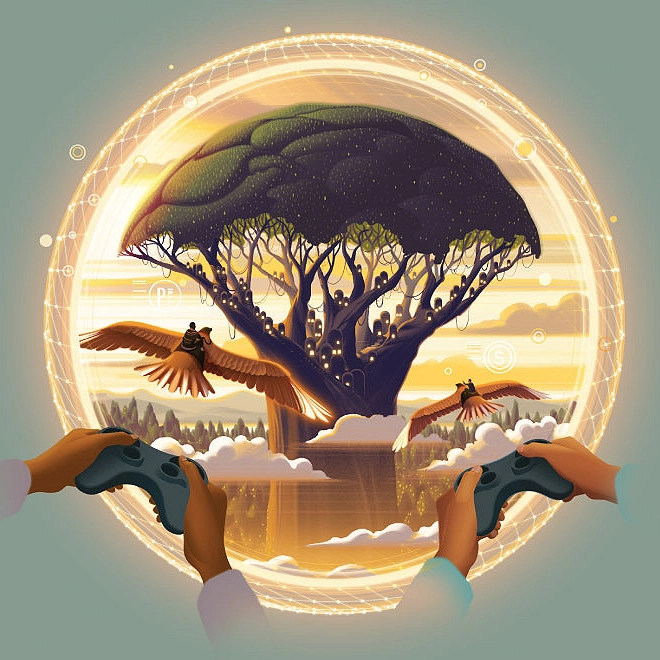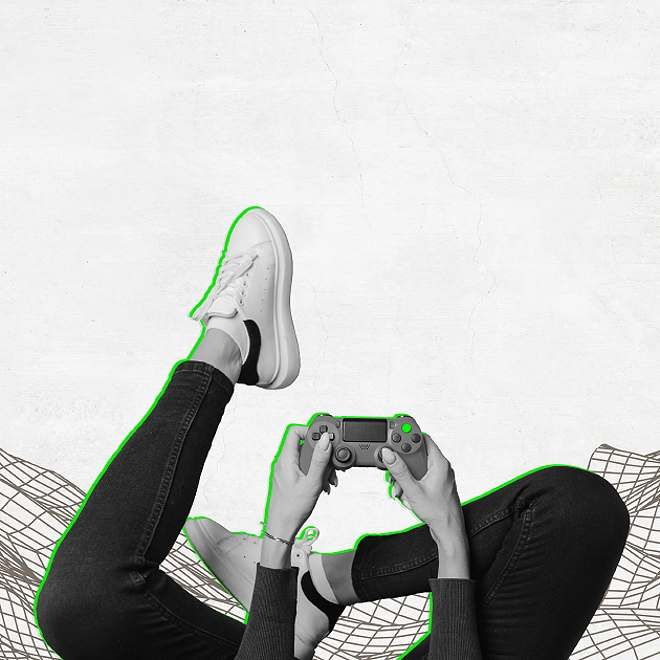For younger gamers, music is a big part of the experience
Gaming and music companies can create more seamless integration between their products—and easier ways to monetize it all
Gen Z gamers have a strong relationship with music—with music they hear in games, discover while watching game streamers, share with other players, and listen to while gaming. This opens more opportunities for stronger partnerships and better integration between music and gaming companies.

Gaming and music have a strong relationship, yet it can be difficult for gamers to purchase the music they discover or easily add it to playlists. In our Digital Media Trends fall pulse survey, we found that 42% of Gen Z gamers listen to other music while gaming, and 34% hear music in a game and then look it up online to stream or buy. Almost a quarter wish they could purchase music they hear in a game or be able to add it to a playlist, and nearly as many share music recommendations with other people gaming online. Not only does this show the relationship between gaming and music, but it also suggests opportunities to enhance engagement—and revenues—by integrating music and gaming more tightly.1
As big-budget games deliver cinematic experiences, storylines, and top-tier acting talent, they also invest in compelling and engaging soundtracks. Some of the most successful gaming franchises have seen their soundtracks and theme songs become popularized over decades.2 However, it can be difficult to find these songs outside the games.
For highly competitive player-versus-player (PvP) games, players may choose to have their own soundtracks, which help them feel more energized and competitive, focus better, or simply maintain a good mood during a challenging game.3 Our survey found that 22% of Gen Z gamers are sharing music recommendations with others in online games. And, yet, there’s no easy way for them to add a song to a playlist or purchase it without leaving the game.
A recent global survey found that gaming influencers—those on social media sharing gaming content to large audiences of followers, often through live streams—are the second-most popular type of influencer for US teens, just behind music influencers.4 Although gaming companies may leverage top influencers to promote their games, streamers are often challenged by onerous copyright protections, and may even receive takedown notices if the game’s own music is audible in their livestream.5 Making it easier for streamers and influencers to share gaming and music content can make it easier for their audiences to discover and engage with that content.
While music can complement gaming, musicians are increasingly reaching audiences inside game worlds. Top online games now draw tens of millions of players daily. Some have in-game radio stations that feature exclusive new music releases from top artists, even offering those artists roles in the game’s story.6 Others are producing music events that bring musicians into larger-than-life immersive experiences, selling digital and physical merchandise along the way.7
For many, a popular game world is more than just a game: It’s a social destination for immersive and interactive entertainment. Amid growing talk of the metaverse, top social games already host hundreds of millions of players spending more of their time and money in digital spaces.
Recommendations for executives
As more people—especially younger generations—spend more of their time gaming, media and entertainment companies should continue to look for innovative ways to reach and engage these audiences.
Some approaches to consider:
- Look for synergies between gamers and game streamers, game companies, and music providers. How can gaming companies grow their audiences with music? How can music producers and publishers get more of their artists in front of gamers? And which points of integration between them could be developed or refined?
- Explore game platforms as ways to innovate on content experiences. What opportunities are there for cobranding, crossovers, and live in-game events that combine music and gaming while leveraging the capabilities of game platforms?
- Leverage influencers and game streamers. How can gaming and music influencers play a stronger role?
- Work to loosen copyright restrictions to better support content creators and influencers. What are ways that music rights owners can make reuse easier while still securing revenues? Could there be more paid tiers for streamers to reuse licensed music in their streams?
- As more games become services, with point-of-sale systems built in, music rights holders should explore ways to make music and merchandise more easily purchasable within video games and services. This can give musicians more direct access to large gaming audiences—and lay the infrastructure and user experience (UX) for other forms of in-game shoppable media.
Technology, Media & Telecommunications
Deloitte’s Technology, Media & Telecommunications (TMT) industry practice brings together one of the world’s largest group of specialists respected for helping shape many of the world’s most recognized TMT brands—and helping those brands thrive in a digital world.



